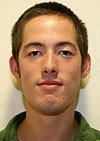Chris Henry’s potential statistical line in 2007: 879 rushing yards, 67 receptions, 17 total touchdowns – the season averages of Texas Tech’s running backs the last three seasons under new Arizona offensive coordinator Sonny Dykes.
Yet Henry didn’t see things unfolding that way. Last month, he declared he wasn’t confident about the role he would play in Arizona’s attack next year. He also claimed to be peeved at how the team used him, or seldom did so, over a six-game stretch corresponding with the start of Pacific 10 Conference play.
Now, Henry is poised to forfeit his senior year. In so doing, he would sabotage his chances at a profitable, productive NFL career.
“”There’s legitimate reason for him to leave with the offense changing a little big,”” said Rob Rang, the senior analyst for nfldraftscout.com, in a phone interview. “”(But) my personal opinion is that it doesn’t show a lot of confidence in him to retain the job. … If you can’t keep the job in college, how are you going to keep the job in the NFL?””
Henry, with the speed and brute force of a stallion, just may melt the mercury in scouts’ stopwatches at the NFL Combine in February.
An impressive showing there could convince a team to look past his mediocre on-field resume (3.4 yards per carry over his career). Once the draft’s first two rounds are over, teams tend to be more willing to reach for athletes like Henry who possess rare athleticism but sometimes little else.
Kyle Trembley, the head draft analyst for draftclass.com, thinks Henry could be selected as early as the first day if he excels in the 40-yard dash at next month’s NFL Combine.
“”If he runs something crazy at the Combine, like a 4.35, and does well in all the other position drills, I could easily see someone taking him in the high third round,”” Trembley said. “”Some general manager will fall in love with him.””
But the analysts’ consensus is that Henry will likely be taken in the later rounds.
A strong showing at the Combine appears to be Henry’s best and only chance to get into the league. Scott Wright, president of nfldraftcountdown.com, said Henry will have to blow scouts away with his physical skills to even get drafted.
If he doesn’t, Wright said, his stock will be crippled by a lack of production at Arizona and his status as an underclassman, which precludes him from showing off his skills in a postseason all-star game.
“”He’s put a lot on his being able to run well (before scouts),”” Wright said. “”I would definitely say his decision to leave falls into the category of ‘questionable’ at best.””
Obvious intangibles that play into Henry’s favor include his ideal size (6-foot, 233 pounds) and his foot speed. He was clocked between 4.40 and 4.49 seconds in the 40 coming out of high school, according to rivals.com, a recruiting Web site.
The emergence of former Wildcat Mike Bell, who went undrafted in April, as the Denver Broncos’ sometimes-starter this season also helps Henry’s case, the analysts said. Bell’s success shows Arizona can currently produce NFL-caliber backs.
But the two athletes have clear differences, namely in their numbers.
Bell finished his career in 2005 as Arizona’s fifth-leading rusher, with three straight 900-yard seasons. Henry has 859 rushing yards in his career, and much of his career- high 581 yards this year came in a single game, Nov. 11 at Oregon.
“”I like Bell’s ability to say, ‘Hey, I can only getthree yards out of this run,’ and he’ll get them,”” Rang said. “”That’s the problem I have with Henry. I found him sometimes trying to dance too much. He’ll try to get a 90-yard run out of a three-yard run, and he’ll take a loss.””
Henry has yet to prove himself as a dependable, consistent, every-down back. And gimmicky sort of rushers, with cartoonish musculatures but not much more to offer, rarely – if ever – pan out in the pros.
All of the analysts were baffled that Henry decided to bolt despite the prospect of starring in an offensive system that not only suits his skills as a rusher and pass-catcher but also could show him as a starter-worthy one day in the pros.
“”It would have definitely helped him if he came back,”” Trembley said. “”First, he has to prove that he can be a running back, because his yards per carry weren’t great, and he didn’t have a lot of 100-yard games. Second, (he needs to improve) as a pass catcher. He didn’t have a lot of opportunities this year. Presumably, he would have had that opportunity in his senior year.””
Henry, for his sake, should do the smart thing for anyone considering an NFL career, least of all one trying to make a mark at one of the league’s most high-profile positions.
He should come back and earn his playing time, prove his perceived doubters wrong as a dependable, consistent, every-down back under Dykes. He has until Jan. 18 to file intent-to-return paperwork with athletic director Jim Livengood.
Such a move may be wishful thinking. Henry may have already hired an agent, and he would lose his remaining eligibility if there’s truth to the accusations that he used a runner from a recruiting Web site to act as a liaison with possible representation.
So, at this point, seeing Henry back in an Arizona uniform doesn’t seem likely to happen. What a pity, both for a talented athlete and for an offense that will surely suffer without him.
-Tom Knauer is a journalism senior. He can be reached at sports@wildcat.arizona.edu









